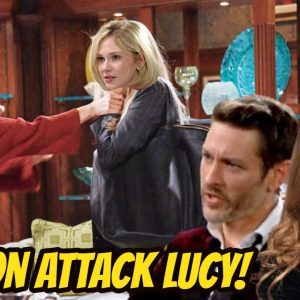Genoa City was plunged into a whirlwind of deception and revenge,
centered around the intricate web of relationships involving Billy Abbott, Chelsea Lawson, and Adam Newman.
Recent revelations about Chelsea’s infidelity shattered Billy’s world, transforming his once-anticipation-filled future with Chelsea into a dark, vengeful plot. Billy, who had eagerly anticipated their upcoming wedding, now found himself grappling with profound feelings of anger and betrayal.
Billy had always believed in the promises he and Chelsea made to each other, especially their commitment to marry by the year’s end. For him, their wedding was not just a ceremony but a cornerstone in building a life together with Chelsea, whom he deeply loved. However, the discovery of Chelsea’s betrayal with Adam shattered his trust and left him reeling.
Chelsea, on her part, had viewed Billy as a safety net, a fallback option if things with Adam didn’t work out. She never fully committed to Billy in the same way he had to her. Adam’s recent behavior, distancing himself from Chelsea and evading responsibility, left her in a vulnerable position as her primary plan unraveled.
Rather than immediately confronting Chelsea, Billy devised a meticulously calculated plan for revenge. He chose to wait until their wedding day to expose Chelsea’s infidelity, intending to publicly humiliate her in front of their families and friends. The thought of Chelsea, in her wedding dress and expecting to embark on a new chapter of her life, only to be publicly shamed, filled Billy with a mix of grim satisfaction and remorse.

Viewers, aware of Chelsea’s manipulative tendencies, might empathize with Billy’s desire for retribution. They see Billy as a good man who genuinely loved Chelsea, viewing her betrayal as deserving of consequences. Yet, the morality of Billy’s plan is complex. Is it justified to exact such a severe punishment, even on someone who has wronged you? The prospect of public humiliation, especially on a day meant for joy, raises ethical questions about the nature of revenge.
Billy’s life was already fraught with professional challenges, leaving him emotionally drained and unable to fully process his feelings towards Chelsea. This exhaustion influenced his decision to maintain the facade of their relationship while harboring plans for its dramatic end. While understandable from an emotional standpoint, Billy’s plan to expose Chelsea’s betrayal on their wedding day could be perceived as excessively cruel and emotionally damaging.
Psychologically, Billy’s actions represent a quest for control in a situation where he felt powerless. Chelsea’s betrayal had stripped away his agency in their relationship, and orchestrating this public revelation was his attempt to reclaim it. However, revenge often carries unforeseen consequences. The toll on Billy’s own emotions, the potential collateral damage to others, and the long-term repercussions on his psyche were factors he may not have fully considered.
As Billy navigated this emotional minefield, he also wrestled with his professional responsibilities, compounding the stress of his personal life. His decision to delay the breakup and continue playing the role of Chelsea’s loving partner added another layer of complexity to his already turbulent situation.
Ultimately, Billy’s plan reflects a profound internal struggle. He is torn between his enduring love for Chelsea, the profound sense of betrayal he feels, and his desire for justice. Whether he follows through with his plan will depend on his ability to balance these conflicting emotions and anticipate the consequences of his actions.
The saga of Billy, Chelsea, and Adam serves as a poignant reminder of the intricate dynamics of human relationships. It underscores the fine line between love and hatred, the destructive power of betrayal, and the painful consequences of seeking revenge. As the residents of Genoa City watch this drama unfold, they are reminded that matters of the heart rarely yield easy answers or straightforward resolutions.





